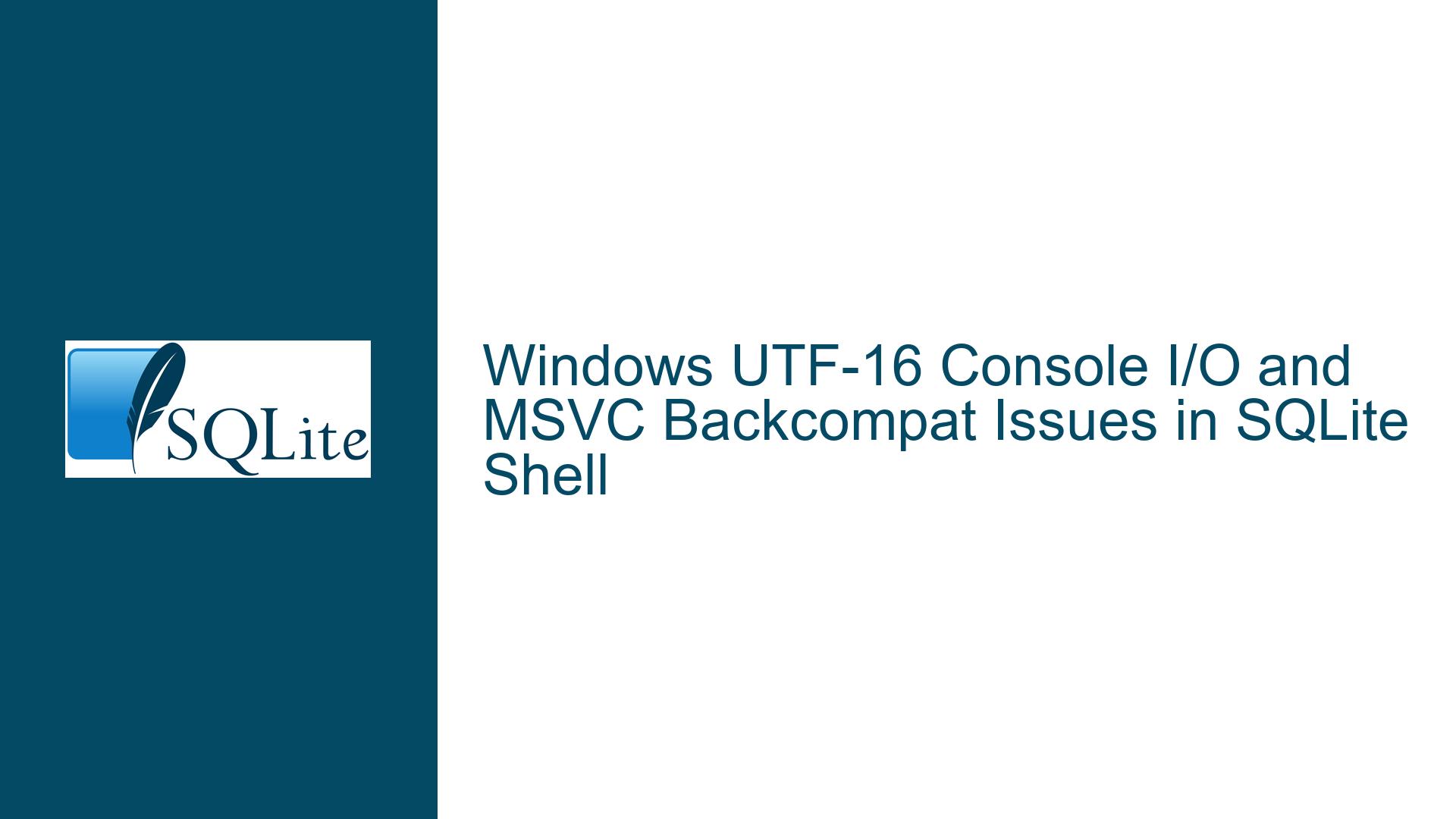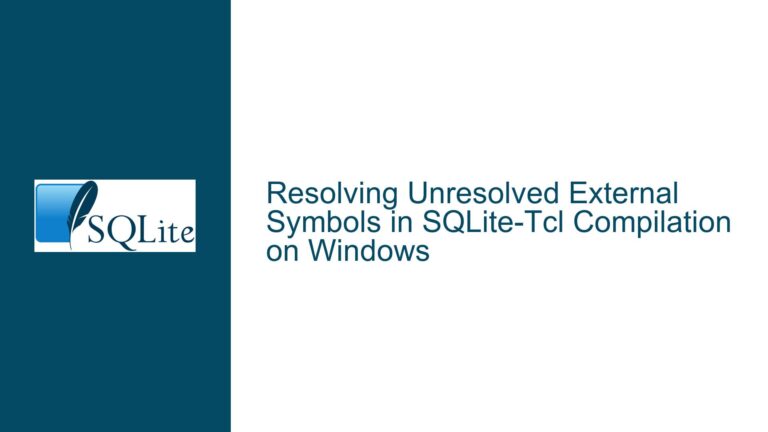Windows UTF-16 Console I/O and MSVC Backcompat Issues in SQLite Shell
SetConsoleMode() Failures on Older Windows Versions
The core issue revolves around the use of the SetConsoleMode() function in the SQLite shell, specifically when the ENABLE_VIRTUAL_TERMINAL_PROCESSING flag is included. This flag is designed to enable the interpretation of Virtual Terminal (VT) sequences on Windows consoles, which are sequences of characters that control cursor movement, color, and other text attributes. However, this functionality is only supported on Windows 10 and later versions. When the SQLite shell attempts to set this flag on older versions of Windows, such as Windows XP or Windows 7, the SetConsoleMode() call fails. This failure can lead to unintended consequences, particularly if other console mode flags are also being set in the same call.
The problem is exacerbated by the fact that the SQLite shell does not check the return value of SetConsoleMode(). As a result, if the call fails, the console mode may not be set to the desired state, potentially causing issues with console output. For example, if the ENABLE_VIRTUAL_TERMINAL_PROCESSING flag is combined with other flags in the same SetConsoleMode() call, and the call fails on an older version of Windows, none of the flags will be applied. This could leave the console in an inconsistent state, where certain features (like line editing or text wrapping) may not work as expected.
Furthermore, the use of ENABLE_VIRTUAL_TERMINAL_PROCESSING is not always appropriate. This flag should only be used when a program explicitly intends to print VT sequences. If the flag is enabled without such intent, the console may interpret certain characters as control sequences rather than printable text, leading to unexpected output. This is particularly problematic in the context of the SQLite shell, where users may not have full control over the data being displayed. For instance, if a database contains text that includes VT sequences, enabling ENABLE_VIRTUAL_TERMINAL_PROCESSING could cause the shell to interpret these sequences as control codes, potentially rendering parts of the output invisible or garbled.
Missing <stdint.h> Header in Older MSVC Compilers
Another issue raised in the discussion is the inclusion of the <stdint.h> header in the SQLite shell code. This header provides a set of typedefs that define integer types with specific widths, such as int32_t and uint64_t. However, <stdint.h> is not available in older versions of the Microsoft Visual C (MSVC) compiler. This can cause build failures when attempting to compile the SQLite shell with these older compilers.
The inclusion of <stdint.h> appears to be unrelated to the UTF-16 console I/O changes, but it was initially thought to be connected due to the timing of the changes in the Fossil project. The header is necessary for ensuring that the SQLite shell can use fixed-width integer types, which are important for maintaining consistency across different platforms and compilers. However, the latest versions of MSVC do not require this header, as they provide equivalent types through other means. This raises the question of whether the inclusion of <stdint.h> is necessary for the SQLite shell, especially if it causes build issues on older compilers.
The discussion also touches on the broader issue of backward compatibility. While it is important to support older platforms, there is a trade-off between maintaining compatibility and leveraging modern features. In this case, the use of <stdint.h> is more likely to be needed by other compilers, particularly those that adhere to the C99 standard. However, for MSVC builds, it may be possible to omit this header or provide alternative definitions for the fixed-width integer types.
Troubleshooting Steps, Solutions & Fixes
To address the SetConsoleMode() issue, the SQLite shell should be modified to handle the failure of the SetConsoleMode() call gracefully. One approach is to check the return value of SetConsoleMode() and, if it fails, retry the call without the ENABLE_VIRTUAL_TERMINAL_PROCESSING flag. This would ensure that the other console mode flags are still applied, even if the VT processing flag is not supported. Additionally, the shell could provide a warning message to inform the user that VT sequences will not be interpreted, which would help avoid confusion if the output appears differently than expected.
Another solution is to make the use of ENABLE_VIRTUAL_TERMINAL_PROCESSING configurable. This could be done through a command-line option or a configuration setting within the shell. By default, the flag could be enabled on Windows 10 and later, where it is supported, and disabled on older versions of Windows. This would allow users to enable VT sequence interpretation if they need it, while avoiding issues on systems where it is not supported.
For the <stdint.h> issue, the SQLite shell could be modified to conditionally include the header based on the compiler being used. For MSVC builds, the header could be omitted, and alternative definitions for the fixed-width integer types could be provided. This would ensure that the shell can still use these types without causing build failures on older compilers. Alternatively, the shell could include a compatibility layer that provides the necessary typedefs if <stdint.h> is not available. This would allow the shell to maintain consistency across different platforms and compilers without sacrificing backward compatibility.
In conclusion, the issues discussed highlight the challenges of maintaining backward compatibility while leveraging modern features. By carefully considering the trade-offs and implementing targeted fixes, the SQLite shell can continue to provide a robust and reliable experience for users across a wide range of platforms and compilers.






